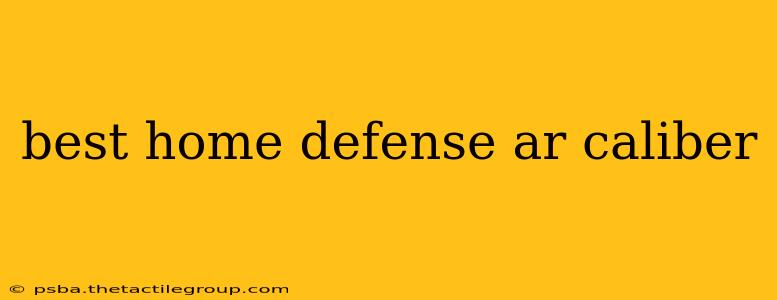Choosing the right caliber for your home defense AR-15 is a crucial decision, impacting accuracy, recoil management, and overall effectiveness in a high-stress situation. There's no single "best" caliber, as the ideal choice depends on individual factors like experience, physical capabilities, and the specific layout of your home. This guide will explore popular options and help you make an informed decision.
Understanding the Key Factors
Before diving into specific calibers, let's examine the critical elements influencing your choice:
-
Recoil: Excessive recoil can hinder follow-up shots, crucial in a home defense scenario. Lighter calibers generally exhibit less recoil, making them easier to manage, especially for less experienced shooters.
-
Stopping Power: This refers to a round's ability to incapacitate a threat. While larger calibers generally offer more stopping power, the placement of your shots is far more important than the caliber itself.
-
Penetration: Over-penetration is a significant concern in home defense. A round that penetrates through walls and into neighboring apartments or houses poses a serious risk. Caliber choice directly impacts penetration potential.
-
Accuracy and Control: Accurate shot placement is paramount. The chosen caliber should allow for consistent accuracy at typical home defense engagement distances (generally under 25 yards).
-
Ammunition Availability and Cost: Ensure your chosen caliber's ammunition is readily available and affordable.
Popular AR-15 Calibers for Home Defense
Several calibers stand out as popular choices for home defense AR-15s. Let's examine their pros and cons:
5.56 NATO (.223 Remington)
- Pros: Lightweight, manageable recoil, relatively inexpensive ammunition, widely available. Excellent for rapid follow-up shots.
- Cons: Can over-penetrate, particularly with certain ammunition types. Stopping power might be considered less than some larger calibers.
.300 Blackout
- Pros: Substantial stopping power, reduced over-penetration compared to 5.56 NATO, quieter than 5.56 NATO (with subsonic ammunition).
- Cons: More expensive ammunition than 5.56 NATO, slightly more recoil.
.458 SOCOM
- Pros: Exceptional stopping power, designed to minimize over-penetration.
- Cons: Significant recoil, more expensive ammunition, limited availability compared to 5.56 NATO or .300 Blackout. Not ideal for those new to AR-15s.
6.8 SPC
- Pros: Balance between stopping power and manageable recoil. Less over-penetration than 5.56 NATO.
- Cons: More expensive ammunition than 5.56 NATO, not as widely available.
Making the Right Choice
The best home defense AR caliber is ultimately a personal decision. Consider your experience level, physical strength, the layout of your home, and the potential for over-penetration.
For beginners or those prioritizing manageable recoil and affordability: 5.56 NATO remains a strong contender.
For those seeking increased stopping power with reduced over-penetration: .300 Blackout presents a compelling alternative.
For experienced shooters prioritizing maximum stopping power (and willing to manage heavier recoil): .458 SOCOM is a viable option. However, carefully weigh the recoil and ammunition costs.
For a balance of stopping power and manageable recoil: 6.8 SPC is worth considering.
Remember, responsible firearm ownership includes thorough training, understanding your weapon's capabilities, and adhering to all local laws and regulations. Consult with experienced firearm instructors and professionals to determine the best caliber for your individual needs and circumstances.

